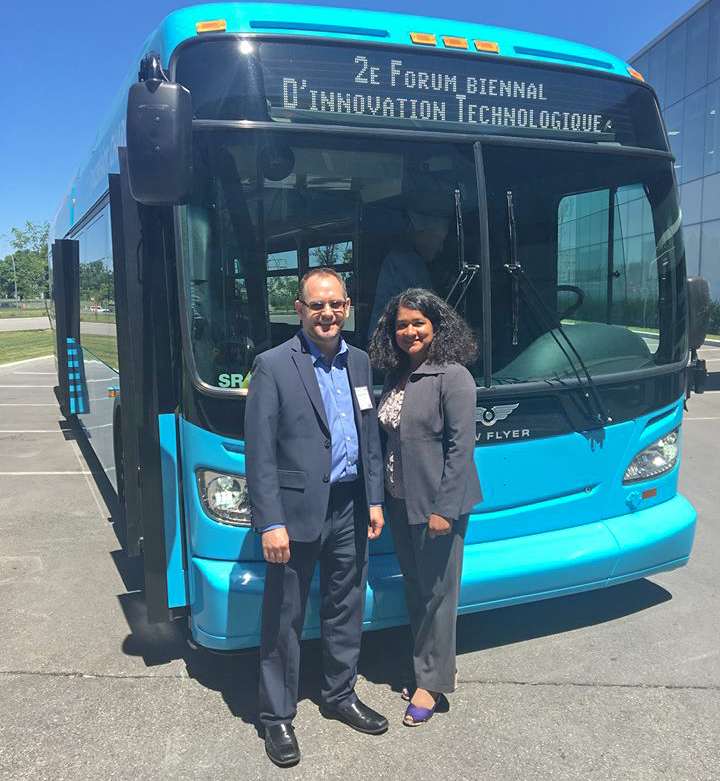Blog Contributor: Erica Harper
On October 22nd, the Environmental Sustainability Research Centre hosted their second Sustainability Seminar Series event of the term. The event consisted of a panel discussion with three professionals in the green infrastructure and low impact design space with decades of rich experiences and knowledge bases. The panelists were: Safdar Abidi, Principal, Practice Leader at Perkins and Will, Dr. Janani Sivarajah, Postdoctoral Fellow at the Environmental Sustainability Research Centre, Brock University and Vineland Research and Innovation Centre, and Paul Leitch, Director, Environmental Sustainability Services at Blackstone Energy Services.
The panel kicked off with an important question – “what do ‘low impact’ and ‘sustainability’ mean to you?”. This question allowed the panelists to provide the audience members with their perspective and lens when it comes to working in the low impact development and green infrastructure industry. The responses varied greatly, but one common theme was that sustainability and low impact design need to be synonymous with social, ecological, and economical resilience. Another key aspect of sustainability that Dr Sivarajah, Mr. Abidi, and Mr. Leitch pointed out was that buildings and designs must be “low impact” not only for humans, but animals, plants, and all other ecological systems for us all to thrive.
The second questions asked panelists to identify challenges that they perceive as roadblocks to implementing low impact development and green infrastructure. Mr. Leitch highlighted that many facilities and organizations have conflicting priorities that get in the way of integrating green infrastructure and low impact development, but that we must properly communicate the benefits of sustainable design for it to be implemented “from the boiler room to the board room”. Additionally, Mr. Abidi stated that as long as we see sustainability as an optional choice instead of a priority, we will not be able to move forward in terms of green infrastructure and low impact development and we must debunk the myth that “climate change is a subjective issue”. Lastly, Dr. Sivarajah mentioned that sustainable design is often an afterthought and we try to fit it in after the “grey” infrastructure is set. Dr. Sivarajah also stated that we need to go back to our roots, making sure that low impact development and green infrastructure are planned from the onset of a development with transdisciplinary perspectives as stakeholders must work together to implement radical green infrastructure.
The event’s last question allowed the audience to get a glimpse into how the experienced panelists view the future of low impact development and green infrastructure. To begin, Mr. Abidi explained that the pandemic has provided humans with a strong signal to take a step back and reflect on the value of being part of a community. For a thriving community, we must have the following: healthier and active lifestyles, equity in terms of access to public spaces, and community building. Dr. Sivarajah drove home the importance of planning urban spaces with intention and in a holistic manner that accounts for accessibility, equity, and sustainability for all living beings. Lastly, Mr. Leitch believes that although the transition towards prioritizing low impact development and green infrastructure will be a gradual one, as behavioural changes expand, green infrastructure and low impact development will become expected standards that offer great benefits tied to wellbeing.
The panel discussion concluded with each professional’s closing statement for audience members. Mr. Leitch stated the importance of generating solutions for complex issues in a “people-oriented way” and to hold strong when it comes to our path with sustainability in school and in our careers. Additionally, Dr. Sivarajah told the students in the audience that they were the future of sustainability and that it is crucial to prioritize your values as they will guide you in the professional world. Lastly, Mr. Abidi left us with the fact that we are in a position of privilege to even have the knowledge to find solutions to climate change and reverse the damage that humans have done to our planet. Mr. Abidi also asked students to think of themselves as “healers of the Earth” as they go on to pursue different career paths in sustainability, low impact development, and green infrastructure.
All in all, this was an inspiring event that helped students gain a deeper understanding of the major current challenges that professionals face in the space of green infrastructure and low impact design, while also being exposed to ways in which we can overcome them with transdisciplinary solutions.
This panel was live-streamed – a recording is available on our YouTube channel.
















